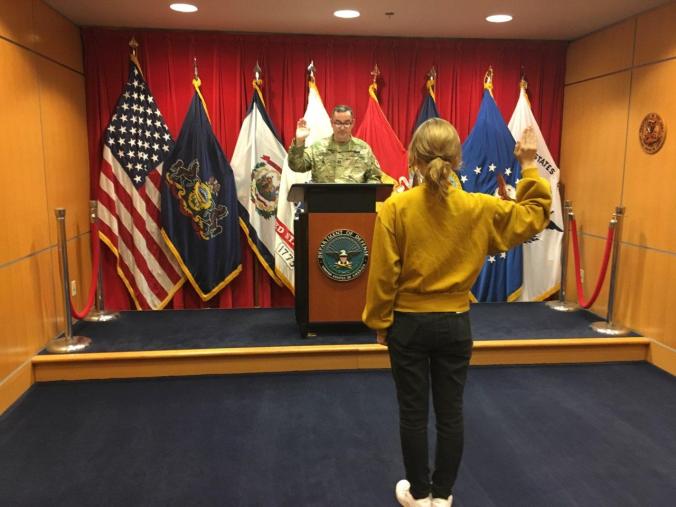
The image above is me administering the US Military Oath of Enlistment to a prospective soldier.
I want to discuss this oath, this basic step, because a lot of people misunderstand the role of the US Military in society. So here goes.
First, the oath of enlistment in its present day form.
I, _____, do solemnly swear (or affirm) that I will support and defend the Constitution of the United States against all enemies, foreign and domestic; that I will bear true faith and allegiance to the same; and that I will obey the orders of the President of the United States and the orders of the officers appointed over me, according to regulations and the Uniform Code of Military Justice. So help me God.” (Title 10, US Code; Act of 5 May 1960 replacing the wording first adopted in 1789, with amendment effective 5 October 1962).
Now I’m going to tear it apart and reveal exactly why a lot of military leaders this week have been hesitant to summon the Regular military to US cities to suppress lawful demonstrations.
First, “I will support and defend…” This refers to the obligation, freely assumed by members of the military, to defend the entire US Constitution against those who would seek to deny its specific rights to fellow citizens or attempt to conquer from without. Some examples would be lawful conflict against Nazis in World War Two, or suppression of the Klu Klux Klan during Reconstruction. The Nazis because they sought to overthrow our system of government, the KKK because they sought to deny the Constitutional rights of their fellow citizens.
“I will bear true faith…” This means that you follow the Constitution to the letter and the spirit, and that you are loyal to the Constitution before all else. It’s why this clause is written before the following clause, which authorizes lawful authority to command.
“That I will obey the orders of the President… officers…” A military member is required to follow the orders of the President and officers, commissioned and non-commissioned. The clause means what it says. However, there is an important caveat; and this is raised in the next clause.
“According to regulations and the Uniform Code of Military Justice…” This body of written regulation and law is first subject to the Constitution. A military member may not circumvent the Constitution. After the Constitution follows regulations and the UCMJ, which are partially subject to international treaties (ex: the Geneva Convention). This clause, within regulation, recognizes the difference between illegal and legal orders. This is a concept which was fleshed out by the Nuremberg Trials of 1945-47; i.e. it is why it is never a sufficient defense to say “I was just following orders” in the course of atrocities, etc.
“So help me God.” The capping clause that acknowledges the supremacy of a deity over the laws and actions of man.
There you go. A nutshell class in why every service member in the United States serves as a guarantor of the freedoms enumerated in the US Constitution, and why they must follow orders, but only legal orders given in the spirit of the US Constitution.
By the way, National Guard personnel have a slightly different oath in which they recognize the command authority of a given state’s governor. Look it up, it’s much the same; also, National Guard personnel are frequently summoned to active duty and they function under Title 10 exactly like regulars. Sometimes people get confused by this, but it’s really simple.
So there you have it, the reason why every US trooper is obligated by law to uphold the Constitution.
If a servicemember acts to deny his or her fellow citizen their Constitutional rights, then they have gone against the base principle that they committed themselves to on their first day of service.
The US oath of enlistment.
It is specifically designed to ensure and lawfully oblige each member of the armed services to protect the Constitutional rights of their fellow citizens; with their lives if necessary.
No matter who is in charge.
That’s interesting – the primacy of the U.S. Constitution in the Oaths. So a President has a major issue if they give an order to a US Military officer which goes against the Constitution.
I’d heard that some of the upper echelon of U.S. Military organisations had openly referred to upholding the Constitution as opposed to necessarily following what the current President may order. This was in response to the BLM protests. I didn’t realise this was based on a sworn Oath.
I can see why the Constitution trumps a President.
Ok, bad pun.
LikeLike
Yes, there is a problem if an order is issued by whomever that causes a soldier on active duty to violate the rights of a civilian. Note my careful wording. Soldier on active duty, civilian. A soldier by definition has given up part of his rights; he or she is subject to military discipline and command authority, civilians are not. There is a firm legal basis that people like General Mattis is acting upon; orders from above are NOT absolutes, and as the final clause states all actions of the soldier are subject to the ultimate moral authority of whatever religion the soldier adheres to.
The oath was very carefully written hundreds of years ago and thoughtfully updated as the years went by. It gives the US soldier legal cover if he refuses an unlawful order. Lawful orders, though, those you must execute under possible pain of death; it’s one of the things that REALLY separate the police from the military. A police officer can quit; a soldier cannot.
I hope this clears things up for you.
LikeLike
Enlightening commentary without professing opinion. Well done.
LikeLiked by 1 person
Pingback: Definitions and Quotes | The Interstellar Valley